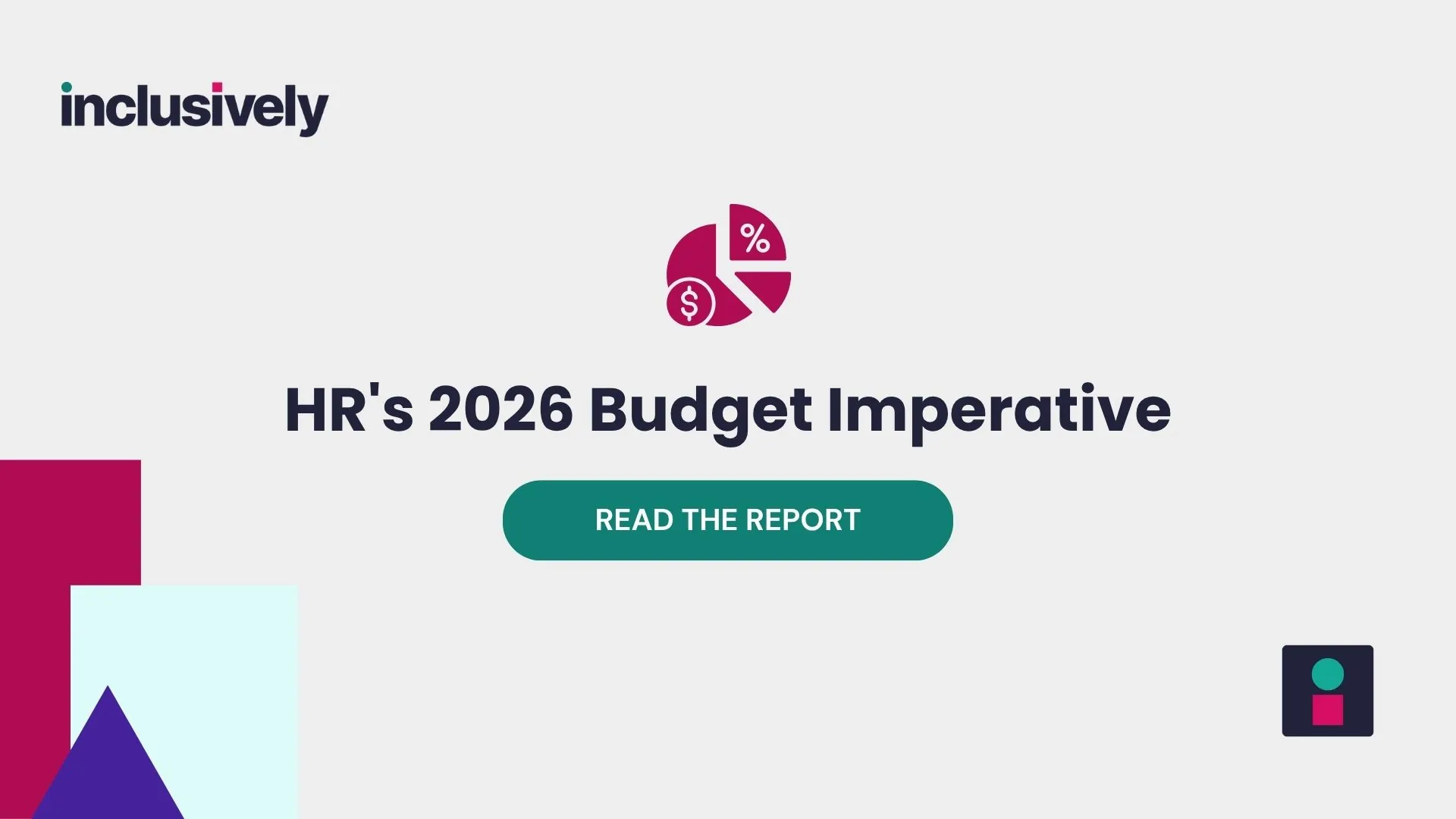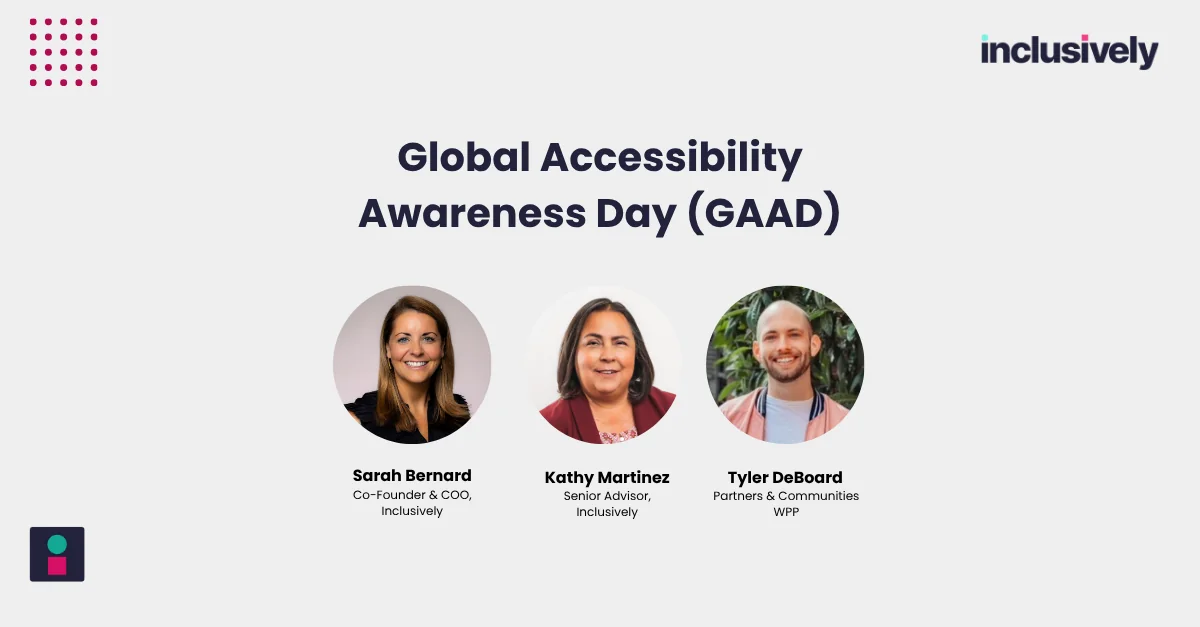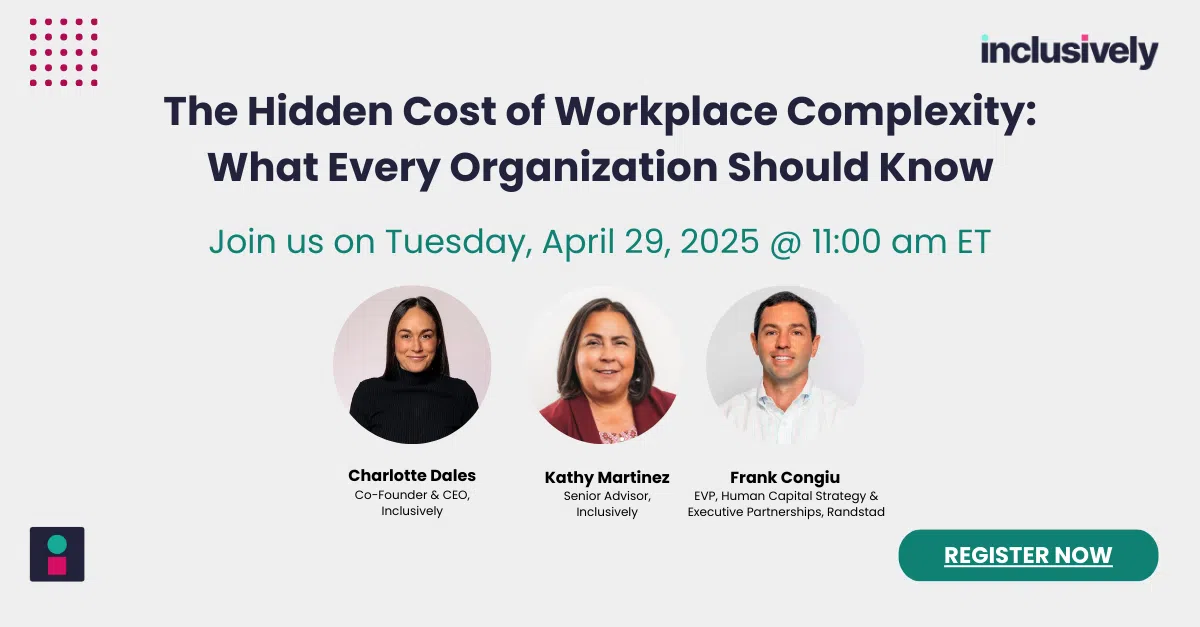Webinar
Legal Frameworks and the Modern Workforce
Thank you for filling out our form. Please enjoy the webinar!
Webinar Transcript
Christina Mallon 0:01
Hi, everyone. I’m Christina Mallon, Head of Inclusive Design at Microsoft and advisor to Inclusively. Welcome to Legal Frameworks and the Modern Workforce. We’re going to be diving into how legal frameworks evolved to adapt to the modern workforce and the new expectations for organizations. Today we will be speaking to Charlotte Dales, Co-founder and CEO of Inclusively, Regina Kline, Founder and Managing Director at Enable Ventures and former disability rights attorney during the Obama administration. And Rob Chestnut, former General Counsel at Airbnb and current investor with Inclusively. I first want to start by letting each of you introduce yourselves. Talk a little bit about your background, and why you’re passionate about this topic. I’m going to start first with you Rob.
Rob Chesnut 0:47
Well, thank you, Christina. My name is Rob Chesnut. I’m a former Department of Justice attorney, federal prosecutor. I spent 10 years at eBay, heading their trust and safety department. And I spent six years as the General Counsel of Chegg, and five years as general counsel and chief ethics officer at Airbnb. I’m passionate about this subject, because I see the world changing. And I see more and more expectations being placed on businesses and leaders. And part of all that really is how you treat your people. And so I think it’s important to talk about this subject and because companies I think are under increasing demands on this area.
Christina Mallon 1:36
Thank you so much for such a great background and technology, really excited to dive into your new, unique perspective today. So Gina, what about you.
Regina Kline 1:46
So it’s so really special for me to be included here and to be with such great colleagues. And it’s great to hear about Rob’s background, my background is one in a number of different fields. I started as a civil rights lawyer and spent about the first 15 years of my career in civil rights. And as a trial attorney like Rob, I was at the US Justice Department enforcing the Americans with Disabilities Act, and in later in private practice as well. And about three years ago, I founded a investment firm that is focused on closing the disability wealth gap through early stage technology investments in the field. And, and I do that through enable ventures and in smart job, really focused in this space on building better ways for people to find, obtain and really sustain employment in our country and doing it through radically inclusive technology.
Christina Mallon 2:46
Thank you so much. And we’re gonna jump over to Charlotte.
Charlotte Dales 2:48
So I’m Charlotte. I’m the CEO and Co-founder of Inclusively. And you know how we got off the ground was, while I was selling my first venture to American Express at the end of 2017. Totally different industry in space. But at that same time, my cousin became the first licensed facialist in the state of Florida with Down syndrome. And after getting my first facial from her, I witnessed how her employer only had to make some slight adjustments to her working environment. And that unlocked an environment where she could be productive and successful in her role. And so Inclusively started as a hiring platform for people with disabilities and helping some of the largest companies in the world like Salesforce and Accenture and delta and Charles Schwab, adapt and address their processes in a way that could meet the needs of candidates with disabilities without disrupting their existing operations. And we’re now leveraging this technology to expand its application to solve for the growing unsettled relationship, which Rob alluded to earlier between employers and employees in this modern workforce, and what we’ve done is figured out how we can leverage that this technology to make it really, really, really easy for large enterprises to address the individual needs and their demands in a way that’s really scalable, and actually positively impacts the bottom line when it comes to productivity and retention versus the sort of misconception that it’s often going to cost more money and be very hard and you know, affect the business.
Christina Mallon 4:27
Well, thank you all for everything you’ve done as a person with dual arm paralysis, I have benefited from your work in the government and in technology. So I’m really, really excited to be here today to chat with you more. So I’m going to kick it off with Charlotte. So really want to understand like, why are we witnessing the relentless pace of change and the demand of personalized experiences at work? Why why now?
Charlotte Dales 4:51
So I think the relationship between employers and their employees has just dramatically changed as you know a lot of people attribute it to COVID it but Gen Z and millennials started taking over the workforce in around 2015, 2016. And these demographics grew up in an education system that always accommodated their needs, whether it was for learning disabilities or mental health. And in addition, everything in our lives now is highly personalized, except for the place where we spend the most of our time, which is our job. And, you know, these generations in particular, never grew up without this level of personalization and having their needs met. So it just is putting a lot of pressure on employers to provide the same level of experience in the workplace. And, you know, companies already spend a trillion dollars a year globally on presenteeism and low productivity. And this number is only going to continue to get worse since a lot of the current frameworks and processes now are really reactive, and they’re manual. And they’re hard to scale. So it’s making this a very expensive problem for companies. And I think, you know, very, very soon, and I think now, people are just starting to realize there’s a huge cost to doing nothing about this.
Christina Mallon 6:07
I mean, that that makes total sense. So Gina, how is the ship affecting the historical framework setup for legal and compliance teams around this topic?
Regina Kline 6:17
Well, it’s really interesting. And just to tag team a little bit on what Charlotte just shared, you know, there’s an irony a rich irony for for those of us that grew up with knowledge of the disability rights movement and the ADA framework, in particular Americans with Disabilities Act, the folks that were fighting for the past 33 plus years, for more workplace flexibility, the pioneers and those that index high on the Net Advantage of flexibility, what was the disability population, and they the population of the organized movement towards disability rights has really given a dramatic contribution to how all Americans work. And that is one of the learnings of the pandemic, which was that there was some wisdom in the ADA framework that is building more productive workers for those out there outside the ambit of the ADA. And what the historical framework of the ADA affords rights to workers to be free from employment discrimination, but also to be able to request flexibility from an employer and have it provided if it’s not an undue burden to that employer to provide that level of flexibility. We now live in a world where it’s not only table stakes, to provide that flexibility to workers. But we can actually see impacts on the bottom line of companies, you know that the companies that have gotten religion, about a, you know, for lack of a better term, about flexibility are seeing abundant benefits, you know, to their bottom line, and to the success of the overall performance of the company. And so those of us that have really familiar with ADA frameworks, there’s sort of an irony to see so often on the, you know, the front page of the Harvard Business Review now about the reverberating benefits of flexibility, the front page of the Wall Street Journal, we saw October last year, on the front page of the Wall Street Journal stories, like the majority of Gen Z workers prefer captioning. Stories, like the majority of Gen Z workers prefer remote work and hybrid work models, and etc, all the things that are in the lexicon of reasonable accommodation under the Americans with Disabilities Act. So there is a group of people, they’re pioneers in the future of work, and they’re called people with disabilities and they build flexibility is table stakes in the conversation.
Christina Mallon 8:53
Well, I couldn’t agree more with that as someone who has a disability and also benefits from a work from home policies through accommodation processes. So Rob, you’ve been on the inside? Can you talk about the risk landscape and how it’s changing? We know that lawsuits are soaring? And how do legal teams react without taking more risk on?
Rob Chesnut 9:12
You know, I think the internet really changed changed the landscape in the world. It made the world more connected. It created a lot of transparency. And it also I think, placed a lot more power in the hands of individuals. We all now have our own newscast. You know, we carry around a camera crew with us in the form of our cell phone. We’ve seen a single blog post can turn a company upside down, like well, Susan Fowler’s blog post at Uber, if employees are unhappy about what they see in the workplace, you know, I think in the in the old days, they were reluctant to speak up, you know, but no more, you know, they’re printing documents out and go into Congress and they’re demanding more of leadership. So the environment has Change in business has to recognize that the world is different, and needs to respond to, to what workers need. And look, you can, you can respond because you’re afraid of lawsuits, you can respond because you feel like it’s the right thing to do. What we’ve really found, it was interesting to hear Gina talk about this, it actually makes it actually pays off to your bottom line. Workers, this is what workers want, workers will gravitate toward companies that deliver in this area. So you know, the the great thing about all this is that it it’s not so much about the cost of doing it. It’s the cost of not doing it and recognizing that if you get ahead, you’re proactive, it can actually help your bottom line.
Christina Mallon 10:48
Yeah, no, I totally agree. And I’m surprised when when most businesses don’t realize that this can help your bottom line. So I want to bring up another kind of topic with you, Rob, it seems like there’s a shift from the traditional model, which was more of like a reactive approach to this to a proactive approach. Do you agree with this? And it seems like maybe it’s because people are starting to see that it does affect your bottom line in a positive way.
Rob Chesnut 11:13
Right? Well, looking at the world and how the world has changed, and how the demands on companies have changed. I mean, like, as a general counsel, you can do two things, you can kind of hide under your desk, and hope that the world doesn’t come after you. Or you can recognize that if you do nothing, it’s more likely that the world is going to come after you. Right. And so the better response is recognize that the world’s change, and understand that this has real benefits to your company and the bottom line, if you can be a leader, right. And so, you know, I think what what I’ve seen over the course of my career is that if you stake out a leadership position on something, you see something that’s not right, you see something that needs fixing, the better approach is to grab it, and lean into it, and, you know, push to become good and push to become better in that area. And I think that that not only insulates you from lawsuits, I think it earns the respect of people in the workforce and earns respect in the community. And as it pays a lot of dividends. So for me, really, it’s the only way to respond to a challenge in the risk world. And that is, you know, lead into it, grab it and do what you can to be a leader
Christina Mallon 12:38
That, that is really smart and shows a lot of leadership. I know Gina, you’ve kind of been on the other side of this battle and seeing the lawsuits and action. What’s your take on this?
Regina Kline 12:50
Yeah, well, my lifelong learning about litigation in general, but in particular, Ada litigation is this knowledge that there is a there conflict arises from an asymmetry and information that there is information that employers have about the accommodations that they can provide, and fairly easily, that’s not always readily available to workers, to employees. And then on the other side, there’s an asymmetry of information, there’s information that workers have, about their needs. And most remarkably, and crucially, we have a massive under identification of disability at work. And there’s no confounding factors like we know why. Which is that there has to be trust built in a relationship for that self identification to happen. But that creates an information asymmetry between a worker in an employer if that if the unmet needs of the worker not known by the employer. And what we need in the ADA space. So fundamentally, is to construct a glass door between a worker and an employer, before one even arrives at an interview, where we break down barriers, build trust, and can trade notes on what the unmet needs of a worker are. And we could do it in a framework that’s not one that’s purely or principally about compliance and lawsuits, but one that’s about the full potential of the worker, and the full potential of the employer to build to build on that employment opportunity. And I think that the ADA framework is built around a legal framework that compels a conversation and a negotiation between employer and employee around accommodations, but if there can be some alignment of purpose This that it has to do with the long term productivity and longevity of the worker in that workplace. You better believe I think we could see more glass doors rather than wooden doors constructed in those conversations between employers and employees.
Christina Mallon 15:17
Yeah, I love starting that conversation. In the beginning. I think this is a perfect segue to you, Charlotte, how are you thinking about your role and enabling employees to become more proactive while also minimizing risk and exposure?
Charlotte Dales 15:32
So at Inclusively, we’re helping companies address the individual needs in a way that minimizes risk because we’re collecting a lot of this data anonymously and sharing it in aggregate, which allows companies to understand company wide needs without linking to individuals fostering a more proactive approach and leveraging a framework that meets the needs and complex complexities of a large organization. And companies are able to anticipate and address these needs in advance, like Gina was saying, and by encouraging employees to educate themselves, before deciding to self identify, we’re avoiding premature self disclosure and unnecessary interactive processes a lot of these things that people want, regardless of if it’s for a disability, or for caregiving responsibilities, or for childcare responsibilities, a lot of the things that people want, can are already offered by the company, they’re already, you know, investing in benefits and services and products. And it’s really how do you automate that information to people so that it almost becomes you know, self serve in a way, so that a lot of the fear that companies have is removed, because one thing we always hear is a fear or concern of employers that it’s going to open up this can of worms, and everyone’s going to start asking for all the things. But that’s already happening. And our product actually creates a framework to automate and reduce the friction here, and an opportunity to decrease like the inconsistencies of, you know, what how one person reacts, and another person reacts in the organization may be different. And it really helps automate and create a framework that enhances the current process. Because this is already happening. So companies need to react now.
Christina Mallon 17:28
Yeah, I love the scalability of your solution to and how this works for large and midsize companies. So we have our last question that I would like you to all answer. If you could provide one piece of advice to legal teams, or C suite and how they can work together to maximize opportunities and mitigate risk in this new era. We’re going to start with Rob, then we’ll go to Gina, and we’ll close with Charlotte.
Rob Chesnut 17:51
Well, I’ll tell you a story of Airbnb. You know, we, we were hit with lawsuits, around discrimination on the platform where guests were being discriminated against based on the color of their skin. And while we were working on that issue very proactively. We started thinking about, well, where’s the next lawsuit gonna come from? And one of the things that we were worried about, frankly, and thought about was, you know, what about people with disabilities who were going to Airbnbs all around the world and struggling to, you know, enter the home or use the use the bathroom there. What about folks like that? We started asking questions around, you know, is does the law apply to Airbnbs? And the like, but I think what we realized deep down was that what’s the right thing to do? You know, the right thing to do is take steps to make Airbnbs more accessible to people with disabilities, in part because the law might require it and there may be risks but also because it’s good for our business. And it was something we all felt really good about. So what we did as a company is we went out and found we found a guy by the name of Srin Madipalli. Srin has been confined to a wheelchair most of his life, and he struggled whenever he traveled. So Srin started a company called Acomable and it was devoted to finding accommodations around the world Airbnb-like accommodations for folks with disabilities. We went out and met Srin, ended up buying his company and bringing him into Airbnb, and turn the whole effort over to Srin, where Srin started working with hosts all around the world to provide data and information around. Well what is the width of the doorway? Are there any steps to your Airbnb? You know, what is your bathroom look like? So so that people could make better decisions about whether their needs were going to be met by a particular thing. And I think the learning for us by this was the business have benefited from from this, legally, we put ourselves in a much better risk position to we went from doing nothing, you know, frankly, to taking a leadership position, and proactively sort of seizing the issue. And, you know, while we weren’t perfect, and while it’s a it’s a years long process, it doesn’t require perfection or requires a sincere effort, and using the tools that you have available to. So I think, you know, my message is, particularly an ounce of prevention is worth a pound of cure, you know, you have to recognize that the issues are there, people are talking about him and concerned, legal departments can can do a great service to their company, by leaning into it, and proactively grabbing issues and seeing what they can do to be a leader.
I love that as someone who has benefited from the accessibility information, Airbnbs really appreciate the proactive activity who you and your team have made. And I think it’s a really smart decision. Gina, you know one piece of advice from you.
Regina Kline 21:32
One piece of advice, I think that Rob is correct in on so many levels about being proactive, but I think, really understanding that the the labor market is changing, and it’s changing in a direction that’s adding tailwinds around the idea that flexibility is king and is here to stay. And that there is a wisdom in the disability accommodation process that probably can be learned from, by good business, across the board for all workers, that we have a dramatic under identification of who our workers are. And that there’s a real opportunity to seize professional development, upward mobility within companies and driving value to business’s bottom line by making sure that workers have the tools they need to enable their success within the company. And that we know that early preventative mechanism for doing that is a transparent conversation with workers about the resources that are available and companies and the transparent conversation the other way from workers about the what their unmet needs are. But when that can be done at scale, we can see a radical reinvention of what businesses and have diverse perspectives and informed decision making of companies and a great diversity in manifold perspectives within companies. So there’s a real opportunity for a renaissance in disability hiring, and also retention, when we have products that can really drive conversations about reasonable accommodations and the unmet needs of workers with disabilities.
Christina Mallon 23:23
Yeah, I love your note about really, we don’t know who has a disability, we don’t know where the mismatches lie between that person and the working environment. So we should just, you know, provide accommodations for all, and Charlotte would love for your insight on this topic.
Charlotte Dales 23:41
Yeah, I think for you know, advice to C suite advice to legal teams. At this point, I’ve probably talked to 1000s of people in both of these roles. And I would say to both that there is just a huge, huge cost to doing nothing about this. And for legal teams. While I know it’s a huge shift from traditional approach, it’s going to result in far less issues in the long run, because the pressure is only going to build as more young people are entering the workforce and rising up into the workforce. And I think, you know, Rob had a great example to say, you know, you don’t need to wait till it’s too late or you don’t need to wait for a lawsuit or you don’t need to, you know, you can be proactive, and it’s not actually going to increase your risk, it’s actually going to decrease it and improve the bottom line. And then for the C suite, it’s just imperative to improve your employee experience so that you can drive productivity and retention of the next generation of the workforce. And you know, we always talk about the future of work, but the future of work is actually already here. And I just I don’t think it’s as scary as people think.
Christina Mallon 24:57
Yeah, it makes total sense, you know, reduce risk and increase your bottom line by doing this. I want to thank you know, Charlotte, Regina and Rob for this amazing conversation and discussion around adopting legal frameworks for the modern workforce needs. Your insights were invaluable and I really think it’s going to help both legal and both C suite at many organizations large and small. So just want to reflect and ask viewers to really consider how to apply today’s insights to your organization for a proactive and personalized approach to workforce management. Visit the website, we have so many resources, you can book a demo at www.inclusively.com. Thank you so much for joining us today and we look forward to future participation in events. Bye, everyone.
Charlotte Dales 25:45
Thank you.

Christina Mallon
Head of Inclusive Design, Microsoft & Inclusively Advisor
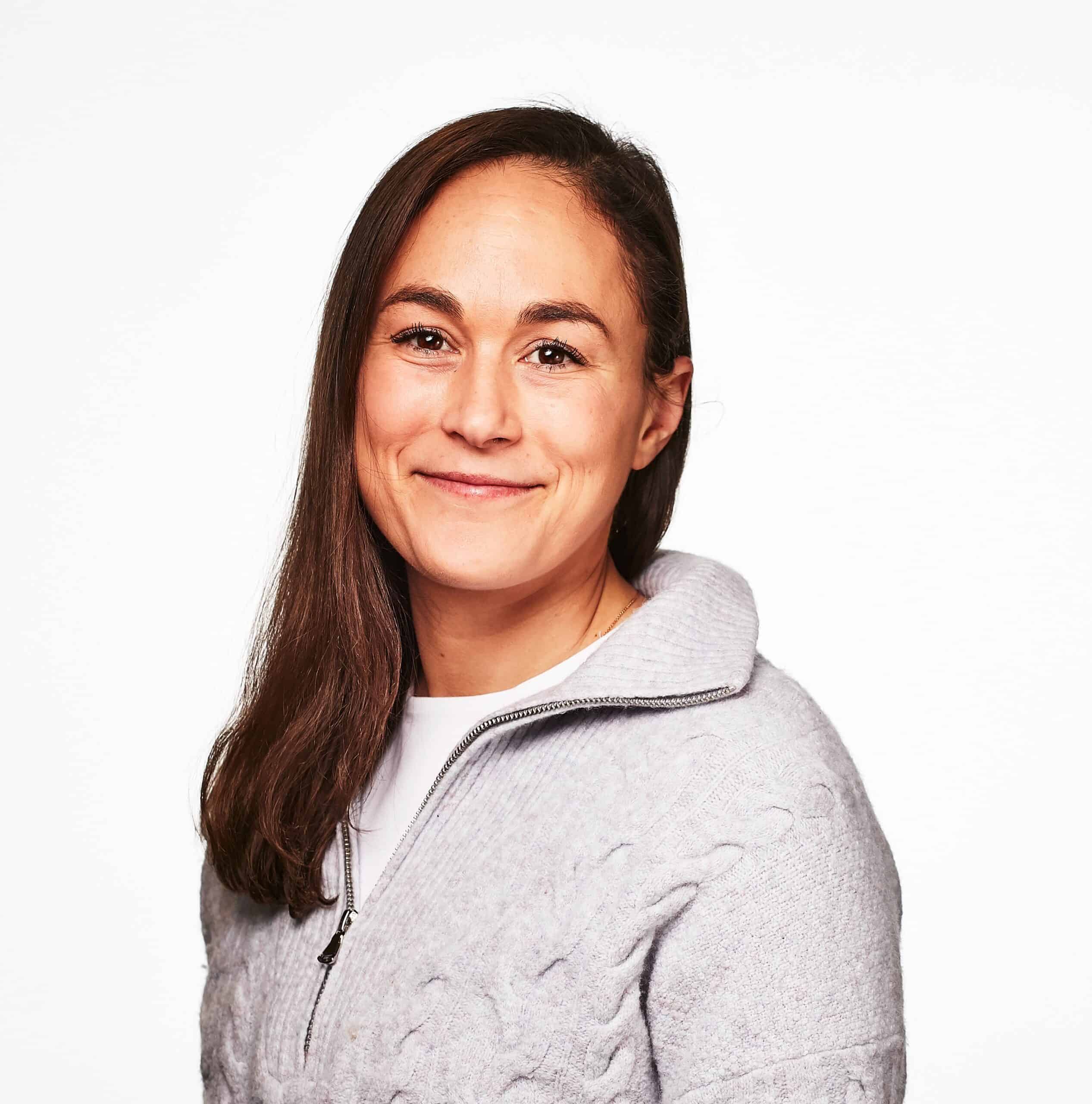
Charlotte Dales
Co-founder & CEO, Inclusively
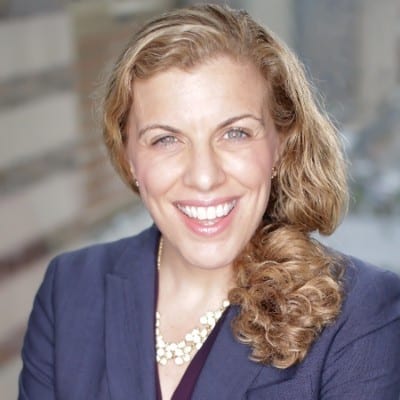
Regina Kline
Founder and CEO, SmartJob LLC
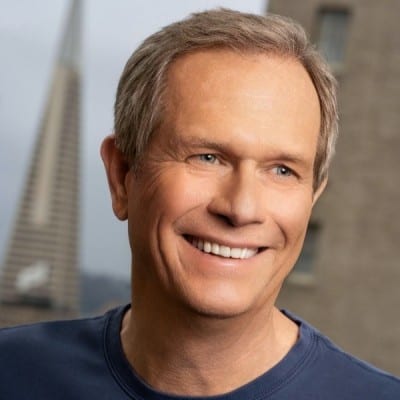
Rob Chesnut
Former General Counsel and Chief Ethics Officer at Airbnb, Author
